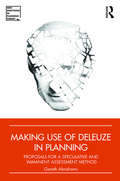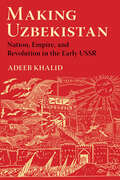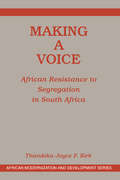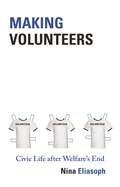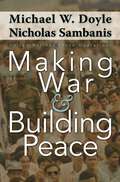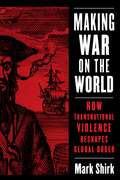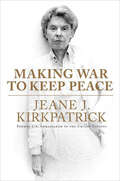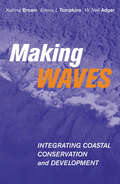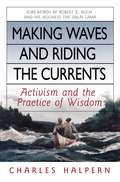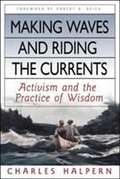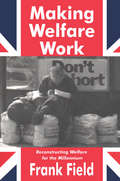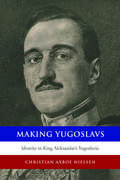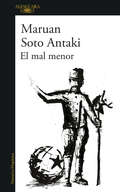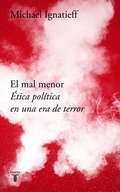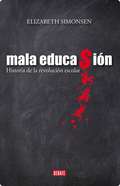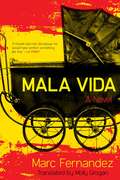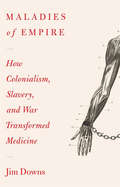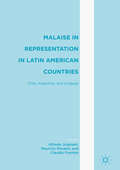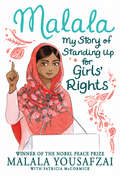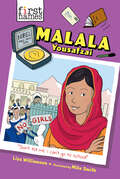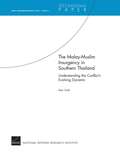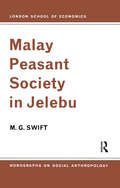- Table View
- List View
Making Use of Deleuze in Planning: Proposals for a speculative and immanent assessment method (New Directions in Planning Theory)
by Gareth AbrahamsMaking Use of Deleuze in Planning translates and re-creates some of Gilles Deleuze’s most abstract philosophical concepts to form a new, practicable planning assessment tool. It shows what his philosophy can do for planning theory as well as planning assessment practice and, in doing so, sets out a pragmatic approach to Deleuzian studies: one that helps form bridges between ontological problems and the problems found in professional practice. It also breaks new ground in assessment methodology by challenging the essentialist ideas underpinning assessment methods like BREEAM and setting out and testing a new form of non-essentialist assessment named SIAM. The book argues that Deleuze’s philosophy can be made useful to planning as long as one is prepared to adapt and re-create his key ontological concepts to respond to the specific demands of the field.
Making Uzbekistan: Nation, Empire, and Revolution in the Early USSR
by Adeeb KhalidIn Making Uzbekistan, Adeeb Khalid chronicles the tumultuous history of Central Asia in the age of the Russian revolution. He explores the complex interaction between Uzbek intellectuals, local Bolsheviks, and Moscow to sketch out the flux of the situation in early-Soviet Central Asia. His focus on the Uzbek intelligentsia allows him to recast our understanding of Soviet nationalities policies. Uzbekistan, he argues, was not a creation of Soviet policies, but a project of the Muslim intelligentsia that emerged in the Soviet context through the interstices of the complex politics of the period. Making Uzbekistan introduces key texts from this period and argues that what the decade witnessed was nothing short of a cultural revolution.
Making A Voice: African Resistance To Segregation In South Africa (African Modernization And Development Ser.)
by Joyce F KirkSince apartheids dissolution in the early 1990s and its formal abolishment in April 1994, there has been increasing interest in the early history of African struggles against segregation and apartheid. This book focuses on the resistance to segregation in the eastern cape town of Port Elizabeth, long known for its tradition of political protest. Joyce Kirk presents a detailed study of men and women in South Africa as they sought to create their own space and voice within the emerging urban areas of nineteenth- and early twentieth-century South Africa. }Since apartheids dissolution in the early 1990s and its formal abolishment in April 1994, there has been increasing interest in the early history of African struggles against segregation and apartheid. This book focuses on the resistance to segregation in the eastern cape town of Port Elizabeth, long known for its tradition of political protest. Joyce Kirk presents a detailed study of men and women in South Africa as they sought to create their own space and voice within the emerging urban areas of nineteenth- and early twentieth-century South Africa. South Africa explores the roots of the tradition of resistance among members of the emergent African working and middle class who were, much earlier than hitherto realized, living permanently in the growing urban areas. Also examined are the changing ideological, economic, and political forces that influenced the colonial government to pursue legislation aimed at depriving Africans of land, housing, and property in the towns, as well as political rights and freedom of movement. Finally, Kirk identifies the ways Africans challenged the governments attempt to use public-health laws to impose residential segregation, the factors that undermined the largely political alliance between whites and blacks in the Cape colony, and the role African women played in challenging racial segregation. }
Making Volunteers: Civic Life after Welfare's End (Princeton Studies in Cultural Sociology #50)
by Nina EliasophAn inside look at how community service organizations really workVolunteering improves inner character, builds community, cures poverty, and prevents crime. We've all heard this kind of empowerment talk from nonprofit and government-sponsored civic programs. But what do these programs really accomplish? In Making Volunteers, Nina Eliasoph offers an in-depth, humorous, wrenching, and at times uplifting look inside youth and adult civic programs. She reveals an urgent need for policy reforms in order to improve these organizations and shows that while volunteers learn important lessons, they are not always the lessons that empowerment programs aim to teach.With short-term funding and a dizzy mix of mandates from multiple sponsors, community programs develop a complex web of intimacy, governance, and civic life. Eliasoph describes the at-risk youth served by such programs, the college-bound volunteers who hope to feel selfless inspiration and plump up their resumés, and what happens when the two groups are expected to bond instantly through short-term projects. She looks at adult "plug-in" volunteers who, working in after-school programs and limited by time, hope to become like beloved aunties to youth. Eliasoph indicates that adult volunteers can provide grassroots support but they can also undermine the family-like warmth created by paid organizers. Exploring contradictions between the democratic rhetoric of empowerment programs and the bureaucratic hurdles that volunteers learn to navigate, the book demonstrates that empowerment projects work best with less precarious funding, more careful planning, and mandatory training, reflection, and long-term commitments from volunteers.Based on participant research inside civic and community organizations, Making Volunteers illustrates what these programs can and cannot achieve, and how to make them more effective.
Making War and Building Peace: United Nations Peace Operations
by Michael W. Doyle Nicholas SambanisMaking War and Building Peace examines how well United Nations peacekeeping missions work after civil war. Statistically analyzing all civil wars since 1945, the book compares peace processes that had UN involvement to those that didn't. Michael Doyle and Nicholas Sambanis argue that each mission must be designed to fit the conflict, with the right authority and adequate resources. UN missions can be effective by supporting new actors committed to the peace, building governing institutions, and monitoring and policing implementation of peace settlements. But the UN is not good at intervening in ongoing wars. If the conflict is controlled by spoilers or if the parties are not ready to make peace, the UN cannot play an effective enforcement role. It can, however, offer its technical expertise in multidimensional peacekeeping operations that follow enforcement missions undertaken by states or regional organizations such as NATO. Finding that UN missions are most effective in the first few years after the end of war, and that economic development is the best way to decrease the risk of new fighting in the long run, the authors also argue that the UN's role in launching development projects after civil war should be expanded.
Making War on the World: How Transnational Violence Reshapes Global Order (Columbia Studies in International Order and Politics)
by Mark ShirkThe state bounds politics: it constructs and enforces boundaries that separate what it controls from what lies outside its domain. However, states face a variety of threats that cross and challenge their geographical and conceptual boundaries. Transnational violent actors that transcend these boundaries also defy the state’s claims to political authority and legitimacy.Mark Shirk examines historical and contemporary state responses to transnational violence to develop a new account of the making of global orders. He considers a series of crises that plagued the state system in different eras: golden-age piracy in the eighteenth century, anarchist “propagandists of the deed” at the turn of the twentieth, and al-Qaeda in recent years. Shirk argues that states redraw conceptual boundaries, such as between “international” and “domestic,” to make sense of and defeat transnational threats. In response to forms of political violence that challenged boundaries, states developed creative responses that included new forms of control, surveillance, and rights. As a result, these responses gradually made and transformed the state and global order. Shirk draws on extensive archival research and interviews with policy makers and experts, and he explores the implications for understandings of state formation. Combining rich detail and theoretical insight, Making War on the World reveals the role of pirates, anarchists, and terrorists in shaping global order.
Making War to Keep Peace: Trials and Errors in American Foreign Policy from Kuwait to Baghdad
by Jeane J. KirkpatrickWith the powerful words that marked her long and distinguished career, Jeane J. Kirkpatrick explores where America has gone wrong—and raises lingering questions about what perils tomorrow might hold. In Making War to Keep Peace, the former U.S. Ambassador to the UN traces the course of diplomatic initiatives and armed conflict in Iraq, Somalia, Haiti, Bosnia, and Kosovo to illuminate the dangerous shift from the first Bush administration's ambitious vision of a New World Order to the overambitious nation-building efforts of the Clinton administration. Kirkpatrick questions when, how, and why the United States should resort to military solutions—especially in light of the George W. Bush administration's challenging war in Iraq, about which Kirkpatrick shares her "grave reservations" for the first time.
Making Waves: Integrating Coastal Conservation and Development
by Katrina Brown Emma Louise TompkinsCoastal zones are critical multiple-use resources, under pressure from constant demands from different sources - conservation, economic growth and social welfare. This book identifies the dilemmas of managing conservation and development in coastal areas. It offers important information on the management, conservation and social implications of coastal resources. The authors present a variety of participatory methods and techniques that can be used to show the success or otherwise of the different uses and how they affect the users. Their interdisciplinary analysis draws upon scientific knowledge as well as the latest social science insights on property rights and governance. The book is intended for researchers and students in geography, development studies and environmental planning, and also for practitioners in natural resource management and coastal zone management.
Making Waves
by Kurt WeylandThis study investigates the three main waves of political regime contention in Europe and Latin America. Surprisingly, protest against authoritarian rule spread across countries more quickly in the nineteenth century, yet achieved greater success in bringing democracy in the twentieth. To explain these divergent trends, the book draws on cognitive-psychological insights about the inferential heuristics that people commonly apply; these shortcuts shape learning from foreign precedents such as an autocrat's overthrow elsewhere. But these shortcuts had different force, depending on the political-organizational context. In the inchoate societies of the nineteenth century, common people were easily swayed by these heuristics: Jumping to the conclusion that they could replicate such a foreign precedent in their own countries, they precipitously challenged powerful rulers, yet often at inopportune moments -- and with low success. By the twentieth century, however, political organizations had formed. Their leaders had better capacities for information processing, were less strongly affected by cognitive shortcuts, and therefore waited for propitious opportunities before initiating contention. As organizational ties loosened the bounds of rationality, contentious waves came to spread less rapidly, but with greater success.
Making Waves and Riding the Currents
by Charles HalpernThis book is about working for a more just, compassionate, and sustainable world while cultivating the wisdom that supports and deepens this work. Charles Halpern is a social entrepreneur with a remarkable record of institutional innovation. He founded the Center for Law and Social Policy, the nation's first public interest law firm, litigating landmark environmental protection and constitutional rights cases. As founding dean of the new City University of New York School of Law he initiated a bold program for training public interest lawyers as whole people. Later, as president of the $400 million Nathan Cummings Foundation, he launched an innovative grant program that drew together social justice advocacy with meditation and spiritual inquiry. In his years of activism, he had a growing intuition that something was missing, and he sought ways of developing inner resources that complemented his cognitive and adversarial skills. These explorations led him to the conviction that what he calls the practice of wisdom is essential to his effectiveness and well-being and to our collective capacity to address the challenges of the 21st century successfully. With wit and self-deprecating humor, Halpern shares candid and revealing lessons from every stage of his life, describing his journey and the teachers and colleagues he encountered on the way--a cast of characters that includes Barney Frank and Ralph Nader, Ram Dass and the Dalai Lama. Making Waves and Riding the Currents vividly demonstrates the life-enhancing benefits of integrating a commitment to social justice with the cultivation of wisdom. It is a real-world guide to effectively achieving social and institutional change while maintaining balance, compassion, and hope.
Making Waves and Riding the Currents: Activism and the Practice of Wisdom
by Charles HalpernThis memoir is about working for a compassionate and sustainable world. This teaches how to integrate the inner and outer work of one's lives through the practice of wisdom.
Making Welfare Work: Reconstructing Welfare for the Millennium
by Valerie JennessThe welfare system in the United Kingdom is broken. The number of claims has escalated and so, in consequence, have welfare expenditures. The social system does not encourage welfare recipients to become independent. Half the population of the United Kingdom lives in households drawing one of the major means-tested benefits. Research documents that means-tests paralyze self-help, discourage self--im-provement, and tax honesty while at the same time rewarding claimants for being either inactive or -deceitful.In Making Welfare Work, Frank Field challenges the current political orthodoxy, particularly its emphasis on the role of legislation alone in bringing about social improvement in a welfare state. Field argues that the impact legislation has on personal character is pivotal to human advance in a welfare state. Welfare reconstruction needs to address and channel the differing roles of self-interest, self-improvement, and altruism, which are among the great driving forces in human character. A successful welfare state must reinforce these important forces which influence our nature because to create an imbalance between these three motive forces will always undermine welfare's objectives.Field discusses in detail aspects of modern British society in dire need of change. These include the drug trade, benefit traps, permanent adolescence, the rise of part-time work, inequality in incomes, excluding the disabled, single parents, and the very elderly, for example. This clearly delineated, well-researched blueprint for success will be important reading for politicians and policymakers in all industrialized nations. Its author is well-positioned to revise and review the welfare policies of democratic -societies.
Making Work, Making Trouble
by Deborah BrockThoroughly updated to include events that have occurred in the decade since it was originally published, this second edition of Making Work, Making Trouble re-establishes this work as the pre-eminent study of prostitution in Canada. Detailing the various forces that have presented prostitution as a social problem, Deborah R. Brock examines anti-prostitution campaigns, urban development, new policing strategies, and the responses of the media, the courts, and governments, as well as feminist, rights, and residents' organizations.Paying particular attention to rights and the means of economic survival within global and local realities, this edition includes new material on recent discourse on sex trafficking, migrant sex work, ex-worker rights organizing, and considers the potential impact of the Robert Pickton trial on the practice of sex work. A comprehensive overview of the crucial debates on prostitution, Making Work, Making Trouble is a welcome addition to twenty-first century sociology and criminology.
Making Young Voters: Converting Civic Attitudes into Civic Action
by John B. Holbein D. Sunshine HillygusIn 2016, 90% of young Americans reported an interest in politics. 80% intended to vote. Yet only 43% of people between the ages of 18 and 29 ended up actually casting a ballot. Making Young Voters investigates what lies at the core of this gap. The authors' in-depth, interdisciplinary approach reveals that political apathy is not the reason for low levels of youth turnout. Rather, young people too often fail to follow through on their political interests and intentions. Those with 'noncognitive' skills related to self-regulation are more likely to overcome internal and external barriers to participation. This book combines theory from psychology, economics, child development, and more to explore possible solutions rooted in civic education and electoral reform. This potentially paradigm-shifting contribution to the literature of American politics serves to influence not only our understanding of voter turnout, but also the fundamental connections between the education system, electoral institutions, and individual civic behavior in a democracy. How young people vote affects not only each individual future, but that of the United States, and of us all.
Making Yugoslavs
by Christian Axboe NielsenWhen Yugoslavia was created in 1918, the new state was a patchwork of Serbs, Croats, Slovenes, and other ethnic groups. It still was in January 1929, when King Aleksandar suspended the Yugoslav constitution and began an ambitious program to impose a new Yugoslav national identity on his subjects. By the time Aleksandar was killed by an assassin's bullet five years later, he not only had failed to create a unified Yugoslav nation but his dictatorship had also contributed to an increase in interethnic tensions.In Making Yugoslavs, Christian Axboe Nielsen uses extensive archival research to explain the failure of the dictatorship's program of forced nationalization. Focusing on how ordinary Yugoslavs responded to Aleksandar's nationalization project, the book illuminates an often-ignored era of Yugoslav history whose lessons remain relevant not just for the study of Balkan history but for many multiethnic societies today.
El mal menor
by Maruan Soto Antaki«En el poder, la traición privada es pública.» A finales del siglo XIX en Estados Unidos, un empresario venido a menos desafió los poderes establecidos en Washington. Joshua Abraham Norton I se autoproclamó Emperador de Estados Unidos y, más tarde, protector de México. Salvo una que otra mención, su recuerdo se perdió en el olvido. Una de las pocas fotografías que le sobrevivieron se encuentra en San Jacinto de las Palmas, pueblo de montaña y próximo al mar en el norte de México, donde ha muerto Don Andrenio, su regidor, terrateniente y benefactor. Sus últimas palabras imploraron evitar que el heredero de la familia Gracián fuera suplantado por Aurelio Guevara; ambicioso y manipulador que amenazaba a un lugar como tantos en el país, hecho a la tranquilidad de sus vicios. El fracaso del nuevo gobierno propiciará la farsa de un régimen de ficción que ocupará el lugar de la realidad. Norton I replicó a Napoleón. El joven Andrenio Gracián seguirá la imagen del emperador. Ante la corrupción y los abusos del poder atrás del poder que representa la falta de escrúpulos de Aurelio, San Jacinto de las Palmas optará por ser súbdito de El mal menor. Satírica y al mismo tiempo cruda y desencantada, El mal menor es en más de una manera una fábula política que juega con los defectos y miedos de la vida pública mexicana.
El mal menor: Ética Política En Una Era De Terror
by Michael Ignatieff¿Cuáles son los límites a la represión y la suspensión de garantías cuando se persigue el terrorismo global? En tiempos de terrorismo, la tentación de no tener piedad puede ser irresistible. Pero la preocupación de que una respuesta violenta nos haga moralmente iguales a nuestros enemigos nos empuja hacia el extremo opuesto. Quizás no haya mayor reto político en la actualidad que intentar ganar la guerra contra el terror sin perder nuestro espíritu democrático. En El mal menor Ignatieff recorre la historia moderna del terrorismo y el antiterrorismo, desde los nihilistas de la Rusia zarista hasta la inaudita amenaza del terrorismo islamista. A la vez, muestra cómo la respuesta más potente frente al terror ha sido la fuerza, contundente y directa, aunque comedida, ya que la ética política que motiva la moderación proporciona a la democracia su mejor arma: el poder moral de aguantar cuando acechan la venganza y el odio. «Las democracias han descubierto lo implacables y determinados que podemos llegar a ser cuando nos atacan, y han adoptado muchos "males menores" -interrogatorios, entrega de presos, detenciones preventivas- con el fin de evitar el mal mayor de capitular ante el terrorismo. Este libro pretende definir qué males menores pueden ser permisibles bajo la ley, siempre y cuando estén sujetos al riguroso sistema de "justificación mediante procedimiento contradictorio".»Michael Ignatieff, en el nuevo prólogo a esta edición Reseñas:«Una argumentación impecable sobre cómo equilibrar seguridad y libertad ante el nuevo tipo de amenaza planteada por los terroristas de hoy. Este libro es un punto de partida esencial para liberales y defensores de las libertades civiles en la lucha contra los difíciles desafíos morales y políticos planteados por la guerra contra el terror.»Publishers Weekly «Excepcionalmente sofisticado, proporciona el contexto mundial e histórico tan necesario para la guerra contra el terrorismo. La gran diversidad de estudios de caso permite a Ignatieff desacreditar cualquier enfoque simplista del terrorismo.»Booklist «Necesitamos consejos sensatos y calmados para equilibrar los intereses de la seguridad y la libertad. Eso es lo que ofrece este extraordinario libro. Ignatieff acerca la historia, la filosofía, la ley y la moralidad democrática al problema. Un libro fascinante.»The New York Review of Books «Un ensayo profundo en el que un destacado intelectual público plantea una de las grandes preguntas de nuestro tiempo: ¿cómo pueden las sociedades occidentales mantenerse fieles a los valores liberales de apertura y libertad cuando derrotar el terrorismo a menudo requiere el secreto y la coacción?»Foreign Affairs
Mala Educacion: Historia de la Revolucion Estudiantil
by Simonsen Muñoz ElizabethEsta es la historia de cómo los escolares se organizaron utilizando la inteligencia y la valentía para decir basta y hacer oír su voz en un país que parecía sordo, ciego y mudo. La noticia dio la vuelta al mundo: cientos de miles de estudiantes se tomaban las calles y los colegios en Chile. Las manifestaciones más masivas desde el fin de la dictadura de Pinochet sorprendían al país, que respaldó las reivindicaciones de los alumnos por una educación laica, republicana y accesible a todos. Esta es la historia de cómo los escolares se organizaron utilizando la inteligencia y la valentía para decir basta y hacer oír su voz en un país que parecía sordo, ciego y mudo. Y es también una profunda investigación periodística que desvela en detalle cómo y por qué se ha fallado en las políticas públicas que redundan en una educación con alarmantes índices de estratificación social, sometida al lucro y con una calidad reprobable.
Mala Vida: A Novel
by Marc FernandezAlmodóvar meets Orwell in this acclaimed, fast-paced contemporary noir novel exposing the most shameful secrets of the Franco era.Present-day Spain, a time of economic crisis and resurgent populist nationalism. The radical right has just won the election after twelve years of Socialist rule. In the midst of this political upheaval, a series of murders is committed, taking place from Madrid to Barcelona to Valencia. The victims include a politician a real-estate lawyer, doctor, a banker, and a nun. There is no obvious connection between them. As the country prepares for a return to a certain moral order, radio crime reporter Diego Martin is trying to keep his head above water in anticipation of the expected media purge. When he decides to look into the first murder, he doesn't have the faintest clue that his investigation will lead far beyond his local beat and put his life at risk. For what he uncovers exposes the roots of a national scandal: the theft of babies from the victims of the Franco regime, crimes—never prosecuted—that were orchestrated by now well-connected citizens who will do anything to avoid exposure.
Maladies of Empire: How Colonialism, Slavery, and War Transformed Medicine
by Jim DownsA sweeping global history that looks beyond European urban centers to show how slavery, colonialism, and war propelled the development of modern medicine. Most stories of medical progress come with ready-made heroes. John Snow traced the origins of London’s 1854 cholera outbreak to a water pump, leading to the birth of epidemiology. Florence Nightingale’s contributions to the care of soldiers in the Crimean War revolutionized medical hygiene, transforming hospitals from crucibles of infection to sanctuaries of recuperation. Yet histories of individual innovators ignore many key sources of medical knowledge, especially when it comes to the science of infectious disease. Reexamining the foundations of modern medicine, Jim Downs shows that the study of infectious disease depended crucially on the unrecognized contributions of nonconsenting subjects—conscripted soldiers, enslaved people, and subjects of empire. Plantations, slave ships, and battlefields were the laboratories in which physicians came to understand the spread of disease. Military doctors learned about the importance of air quality by monitoring Africans confined to the bottom of slave ships. Statisticians charted cholera outbreaks by surveilling Muslims in British-dominated territories returning from their annual pilgrimage. The field hospitals of the Crimean War and the US Civil War were carefully observed experiments in disease transmission. The scientific knowledge derived from discarding and exploiting human life is now the basis of our ability to protect humanity from epidemics. Boldly argued and eye-opening, Maladies of Empire gives a full account of the true price of medical progress.
Malaise in Representation in Latin American Countries
by Alfredo Joignant Mauricio Morales Claudio FuentesThis edited volume examines malaise with democracy within three middle-income Latin American countries - Chile, Argentina and Uruguay. In particular, the book focuses on the gap within public opinion on democratic system within the context of crisis of representation and breakdowns of democracy. Based on a study using comparative and systematic survey data, the contributors of this volume provide a solid analysis on the state of democracy in three Latin American countries, whose lessons are useful for all types of democracy, in the north and the south.
Malala: My Story of Standing Up for Girls' Rights
by Sarah J. Robbins Malala YousafzaiA chapter book edition of Nobel Peace Prize winner Malala Yousafzai's bestselling story of courageously standing up for girls' education. Malala's memoir of a remarkable teenage girl who risked her life for the right to go to school is now abridged and adapted for chapter book readers. Raised in a changing Pakistan by an enlightened father from a poor background and a beautiful, illiterate mother, Malala was taught to stand up for what she believes. Her story of bravery and determination in the face of extremism is more timely than ever. In this edition, Malala tells her story in clear, accessible language perfect for children who are too old for Malala's Magic Pencil and too young for her middle-grade memoir. Featuring line art and simplified back matter, Malala teaches a new audience the value of speaking out against intolerance and hate: an inspiring message of hope in Malala's own words.
Malala Yousafzai (First Names)
by Lisa WilliamsonMeet the young activist who stood up for her rights—and changed millions of lives Before Malala Yousafzai (b. 1997) became the youngest Nobel Prize laureate, she was a girl fighting for her education in Pakistan. Growing up, Malala’s father encouraged her to be politically active and speak out about her educational rights. When she did, she was shot by a member of the Taliban and the story received worldwide media coverage. Protests and petitions from around the world helped to pass an educational-rights bill in Pakistan, and Malala used this platform to continue her activism and fight for women’s rights. Inspiring and moving, Malala Yousafzai tells the story of one girl’s bravery in her fight for equal rights. It includes a timeline, bibliography, glossary, and index.
The Malay-Muslim Insurgency in Southern Thailand--Understanding the Conflict's Evolving Dynamic
by Peter ChalkCurrent unrest in the Malay-Muslim provinces of southern Thailand hascaptured growing national, regional, and international attention due to theheightened tempo and scale of rebel attacks, the increasingly jihadistundertone that has come to characterize insurgent actions, and the centralgovernment's often brutal handling of the situation on the ground. Thispaper assesses the current situation and its probable direction.
Malay Peasant Society in Jelebu (LSE Monographs on Social Anthropology #Vol. 29)
by M. G. SwiftFirst published in 1939 and long out of print, this book remains unique as the only full and detailed account by a social anthropologist of a complete pagan Polynesian ritual cycle. This new single-volume edition omits some of the Tikopia vernacular texts, but includes a new theoretical introduction; postscripts have also been supplied to some of the chapters comparing the performances of 1928-9 with those witnessed by Professor Firth on his second visit to Tikopia in 1952. There is a specially written Epilogue on the final eclipse of the traditional ritual, based on a third visit by the author during the summer of 1966.
